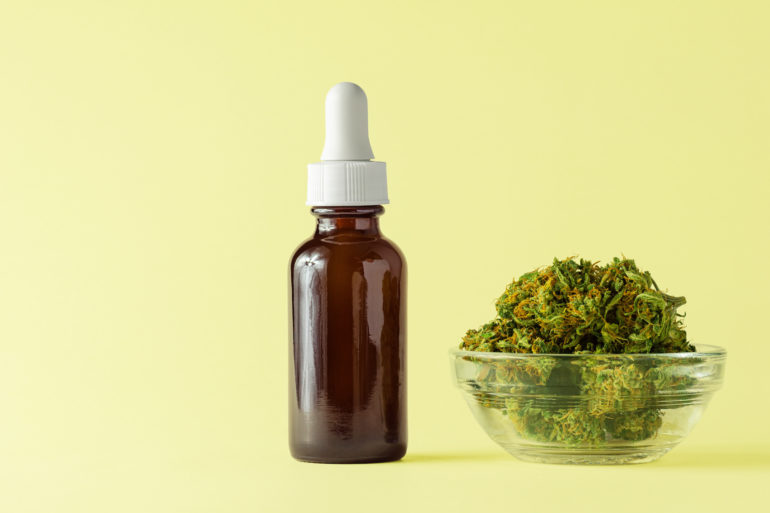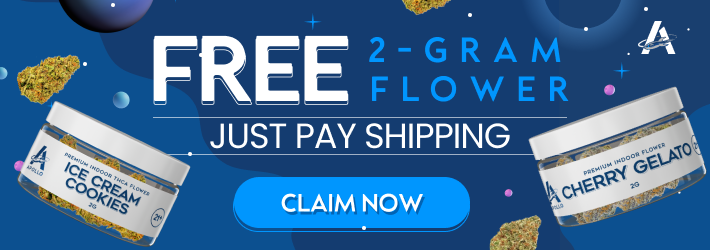“Will CBD oil get me high?” This is the first question on everyone’s lips before they’ve even tried CBD. Totally understandable really. It comes from varieties of cannabis. Cannabis still has a weird reputation of being a layabout stoner’s best friend. Fortunately, there’s more to CBD and cannabis than that. CBD is the second most abundant cannabinoid in cannabis after THC (which gets you high).
You see, cannabis isn’t just about getting high. That’s just one part of it. There is a whole range of other benefits often overlooked by cannabis naysayers.
CBD, for example, has taken the world by storm, not just because of clever marketing, but because it provides your mind and body with balance, wholeness, and equilibrium without the high.
Will you get high from using CBD products?
- Hemp-derived CBD products (CBD oils, CBD capsules, CBD e-liquids, etc) won’t get you high. They’re non-intoxicating. Marijuana-derived CBD products will get you high because of the high percentage of tetrahydrocannabinol (THC).
- CBD oils usually come in 3 forms: Full-Spectrum (many cannabinoids), Broad Spectrum (mix of cannabinoids), and Isolate (solely CBD).
- CBD promotes balance and wholeness to your mind and body. THC provides you with an intoxicating body and head rush/high alongside mood-lift depending on the strain you consume.
- Medical Marijuana aside, CBD alone is seen to help with many conditions including pain, inflammation, anxiety, PTSD, insomnia, MS, epilepsy, anorexia, and much more.
- CBD won’t show up on drug tests; THC will.
- Hemp-derived CBD and CBD products with less than 0.3% THC are federally legal in all 50 states — however, not all states have made CBD legal under state law.
Does CBD get you high? Is CBD psychoactive?
Almost all hemp-derived CBD products contain less than 0.3% THC and are non-psychoactive so they won’t get you high.
CBD Oil
Will CBD oil get you high?
No. Hemp-derived CBD oil is non-intoxicating. Even if you choose to purchase a full-spectrum CBD oil with trace (<0.3%) amounts of THC, you won’t get high, nor will it impair your judgment, thinking, or memory.
Onset
How long CBD oils take to kick in is determined by how you take it. Sublingual application (under the tongue and hold for 10-20 seconds) is superior to simply swallowing it. Why? Because a high percentage of your CBD can absorb through the tissue directly into the bloodstream. Some people report sublingual CBD application works in the body right away, whilst others say it takes around 15-60 minutes.
Duration
CBD oil’s effects should last anywhere between 2-6 hours.
CBD Edibles
Will CBD edibles get you high?
No. Hemp-derived CBD edibles (gummies, chocolates, mints) are non-intoxicating.
Onset
Hemp-derived CBD edibles have to pass through your digestive system. There’s no way around this. This causes the effects to take longer as the CBD absorbs into the digestive system to be metabolized by the liver. Effects usually take 45-60 minutes to kick in.
Duration
The main attraction to hemp-derived CBD edibles is they’re slow-releasing — perfect for those days when you’re on-the-go with a busy work or leisure schedule. Effects typically last 6-8 hours, which is much longer than inhaling CBD concentrates or CBD e-liquids.
CBD Concentrates
Will CBD concentrates get you high?
No. Hemp-derived CBD concentrates are non-intoxicating and won’t give you a high.
Onset
Hemp-derived CBD concentrates are extremely versatile — probably the most versatile CBD product you can buy. The length of time it takes to kick in depends on how you consume it. Inhalation via dabbing is almost immediate. Roughly 10-15 minutes. Oral consumption takes a little longer. Approximately 30-60 minutes.
If you apply it as a topical, it should work within an hour. It won’t, however, do anything for you internally. CBD doesn’t penetrate through the skin’s barrier into the bloodstream unless you purchase a transdermal cream.
Duration
If you inhale CBD concentrates, the effects should last anywhere between 1-5 hours. If you consume them orally, it should last longer due to passing through (and absorbing into) the digestive system and metabolizing via the liver. As a topical, expect to experience the benefits within an hour.
CBD Capsules
Will CBD pills get you high?
No. Hemp-derived CBD capsules/pills are non-psychoactive and won’t get you high.
Onset
Hemp-derived CBD capsules/pills have to pass through (and be absorbed by) the digestive system to then be metabolized by the liver (similar to edibles and oils). This results in CBD (and other cannabinoids) to take longer to work in the body.
Softgel CBD pills absorb much easier into the body. The effects should begin within 30 minutes. Hardshell capsules take slightly longer. Effects should kick in somewhere between 30 minutes and an hour.
Duration
Capsules and pills are slow-absorbing and the effects should be gradual across a number of hours. I usually experience the effects for approximately 3-6 hours depending on the product type (softgel or hardshell). Some people report effects to last as long as 8 hours.
CBD Topicals
Will CBD topicals get you high?
No. Hemp-derived CBD topicals are totally non-intoxicating. Topicals are designed for surface layer skin conditions, muscle pain, and joint issues (amongst others). They don’t penetrate deep enough through the skin to enter the bloodstream to do anything internally. That said, even if a full-spectrum CBD balm, salve, cream, and lotion could penetrate the skin and enter into the bloodstream, it still won’t cause a high.
Onset
Hemp-derived CBD topicals should be “felt” within an hour. It typically doesn’t take much longer than that. Just make sure you apply the topical liberally to your skin or the affected area.
Duration
Hemp-derived CBD topicals generally last around 4-6 hours. Again, it’s worth applying the topical liberally to your skin or affected area to get the most out of it for a longer period of time.
CBD Vapes
Will CBD vapes get you high?
No. Hemp-derived CBD vape products won’t cause a high. They’re completely non-intoxicating. Even if you choose a full-spectrum CBD vape product with <0.3% THC, you won’t get high.
Onset
Effects of CBD vape products work almost immediately in your body (10-15 minutes max). Why? Because inhalation of CBD bypasses the digestive system and absorbs straight into the bloodstream via your lung’s tiny microcapillaries. If you’re looking for an immediate hit of CBD, vape products are the way to go.
Duration
Because they are fast-absorbing, vape products should work in your body for around 1-5 hours. This is much less than, say, CBD edibles or CBD capsules that have to be absorbed and broken down by the digestive system.
Cannabis Oil
Will cannabis oil get you high?
Yes. Cannabis oil (also referred to as marijuana oil or THC oil) certainly gets you high. Why? Because it contains high levels of tetrahydrocannabinol (THC), which is the primary intoxicating cannabinoid found in varieties of hemp (specifically marijuana). New users of marijuana should always be cautious of how much THC is in a cannabis oil product. Too much and you’ll set yourself up for a scary high. Always go for the lowest THC content as a first-timer.
Onset
The length of time it takes cannabis oil to kick in is no different from hemp-derived CBD oil. If you go the sublingual route, the effects of THC should begin within 20-30 minutes (sometimes more or less depending on dose). If you don’t go the sublingual route and swallow it whole, expect THC to kick in within the hour.
Duration
The THC in cannabis oils can last anywhere between 3-6 hours (sometimes longer). This is dependent on tolerance, body weight, and dose. If you’ve taken too much and the THC is really messing with you, find a comfortable spot to lay down, sip some water, and take some CBD (without any THC in it). CBD is said to counteract the effects of THC.
What type of CBD is best for your condition?
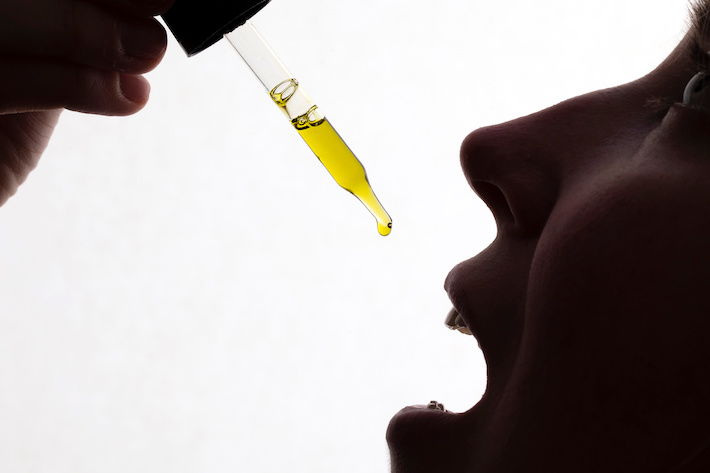
- Full-spectrum CBD oils and full-spectrum capsules for sleep and sleep-related issues — even better if melatonin is added into the formula. Full-spectrum CBD oils are also best for anxiety and anxiety-related symptoms — make sure you consume sublingually for best results. Both methods of delivery are quick and easy.
- Isolate extracts and isolate powders for general wellness, though you can use any other CBD concentrate here too (CBD wax, CBD shatter, etc). The overall strength and potency of these CBD products make them great all-rounders — they’re also very versatile. Can consume sublingually, in food, or using a dab rig/dab pen — the latter is most effective and promotes quicker entry into the bloodstream.
- Vape marijuana-derived cannabis e-liquid for migraines or consume full-spectrum CBD oils for migraines — either one may help here. Vaping will produce almost immediate results. CBD/cannabis oils (sublingual or oral consumption) will be a little more gradual but the range of strengths is generally higher (1000mg CBD oil, 1500 mg CBD oil, etc).
- Full-spectrum CBD/cannabis topicals for acne, skin inflammation, muscle soreness, and joint issues — broad-spectrum CBD/cannabis topicals are useful here as well. Apply liberally to dry, clean skin. Massage the CBD/cannabis topical with a medium level of pressure.
Does THC get you high?
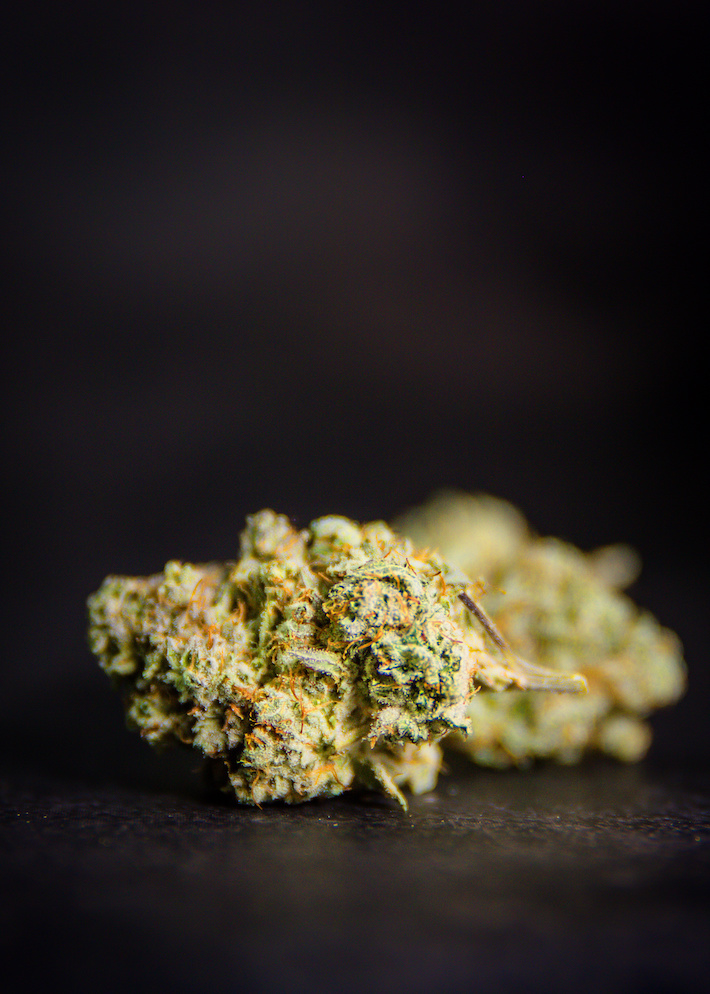
As I mentioned in the section above, THC is very intoxicating, which can be quite off-putting for a lot of new users of marijuana. It’s always worth being cautious when consuming it. Even a small amount (3-5 mg) can send you into a tailspin if your tolerance is low.
How much THC will get you high?
How much THC you need to consume to get high directly correlates with your body weight,
If you’re someone who prefers smoking, one of the biggest mistakes you can make is thinking a cannabis strain with less than 25% THC won’t affect you. It will. Many popular strains contain roughly 14-16% THC. That’s more than enough for me personally. A 25%+ THC strain is only for veteran users — beginners should stick to high-CBD, low-THC strains such as Euphoria, Harlequin, and ACDC.
THC interacts with your body
Both THC and CBD interact with what’s known as your endocannabinoid system (ECS). Your ECS is a naturally-occurring biological system found in all mammals. It’s composed of cannabinoid receptors, endocannabinoids, and enzymes, which all work together to regulate core functions such as sleep, stress, mood, appetite, cognitive ability, reproductive system, and immune system (amongst others).
When consumed, THC and CBD engage with your cannabinoid receptors — cannabinoid receptor type 1 (CB1) and cannabinoid receptor type 2 (CB2). THC actively binds to CB1 receptors (and partially to CB2). CBD has very little affinity with either receptor. Instead, it acts as a cannabinoid receptor modifier — or, rather, it changes the shape of your cannabinoid receptors to stop cannabinoids from binding to them.
For example, when THC binds to CB1, it causes your high (at least in part). When CBD changes the shape of the receptor, THC finds it difficult to bind. The theory is, CBD’s modulation of the CB1 receptor can at least reduce an intense high.
So, if you ever ingest too much THC, always keep a CBD-rich product somewhere near you. It might just save you from some of THC’s side-effects (I’ve gone into more detail about this below).
How does CBD make you feel?
CBD doesn’t make you “feel” anything per se. You won’t feel like you’re lifting off the ground, nor will you feel like you’re on another planet. It’s a very unique experience. You almost get a sense of wholeness and balance much akin to drinking a warm cup of peppermint tea. Your mind and body know there’s a sense of physiological equilibrium going on, which, in turn, allows you to think clearer and more positively.
Sounds quite romanticized, right? Well, that’s because it is. My view on CBD is it helped change my life for the better. I feel more in tune with myself. I don’t feel so worn-down or anxious about daily stresses in my life. I think that’s why so many people vouch for its benefits — myself included.
However, there are people who don’t have that same view. Some believe CBD is a hoax because it didn’t work for them, whilst others have felt groggy, drowsy, and somewhat nauseous after taking it — nausea is a rare CBD side-effect, by the way.
On the other hand, there are many who believe they can “feel” the CBD working within them. I’m not 100% sure whether this is a placebo effect or the mind playing tricks on the body (or vice versa) but who am I to judge that? It’s all very personal to the user.
A lot of it is down to the products you buy. If you purchase a low quality, ineffective CBD oil or capsule product, the chances are it won’t do much for you. Make sure you find reputable CBD companies that produce the finest products with the finest cannabis extracts (as well as all-natural ingredients).
How does THC make you feel?
THC is the opposite of CBD. You’ll feel it when you take it. This feeling is often likened to a full body and head rush with an almost “woozy” sensation. Some users liken it to being hit by a freight train in slow motion or like your brain walking on the moon and time doesn’t really matter.
However, certain strains are also known to provide focus and clarity, or a sense of self-reflection and confidence — sativas are particularly great here. Jack Herer, Lemon Haze, and Sour Diesel are excellent choices if you’re looking for something a little more uplifting and confidence-boosting.
There are times when THC can make you feel pretty awful too. I’ve personally experienced some horrible THC side-effects. There was once a time in Amsterdam where I smoked a blunt of Amnesia and thought my whole world was ending. I experienced every possible side-effect of THC imaginable.
THC side-effects include:
- Red, puffy, and/or bloodshot eyes
- Dry mouth
- Nausea and/or vomiting (if taken too much)
- Increased/rapid heart rate
- Memory loss
- Coordination issues
- Impaired thinking
- Slow reactions
- Anxiety, worry, nervousness, and paranoia
CBD doesn’t give you a head or body high (but it does come with a whole host of non-intoxicating benefits)
CBD doesn’t give you a head or body high. There’s nothing intoxicating about it. If you’ve ever had a head or body high from consuming any cannabis-related product, THC is the culprit. CBD, however, will provide your body with a sense of balance and wholeness.
Studies show CBD’s potential to combat:
- Anxiety & anxiety-related disorders
- Insomnia & sleep-related disorders
- Pain & inflammation (multiple sclerosis (MS), cancer-related pain, etc)
- Nausea & vomiting (chemo/cancer-related nausea & vomiting)
- Acne & skin disorders
- Schizophrenia & other psychotic disorders
- Substance abuse
How long do CBD effects last?
The length of time CBD’s effects stay in your body comes down to the following:
- Your CBD tolerance (how long you’ve been using it, how frequently you use it, etc)
- Your body weight
- Your body’s water content
- Your metabolism
- If you’ve eaten or not (food can slow down CBD’s journey through your digestive system)
The product type and delivery method are also a big part of it, especially how quickly it takes for your body to experience the effects. Smoking hemp flower or inhaling concentrates and e-liquids deliver CBD into your body much quicker than edibles. Why? Because inhalation bypasses the digestive system altogether and goes straight into the bloodstream via your lung’s microcapillaries.
As a general rule of thumb, inhalation of CBD takes about 10-15 minutes to start working in your body. If you consume edibles, it typically takes between one to two hours.
The length of time CBD stays in your body and produces physiological benefits comes down to the dose — the more CBD you put in your body, the longer it’s going to last. Some people report the effects lasting roughly 4-6 hours, whilst others have said 2-3 hours. I typically experience CBD’s effects for about 5 hours but it can be more (or less) sometimes.
Does CBD show up on a drug test?
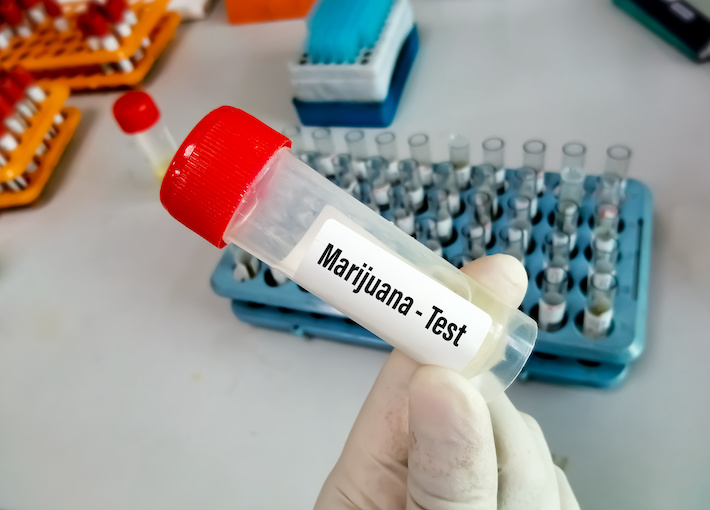
CBD doesn’t show up on a drug test. THC, however, does show up on a drug test. I recommend you stay away from any marijuana-derived products if you have a drug test in the next 60-90 days.
I would even stay away from hemp-derived full-spectrum products with <0.3% THC. I’ve personally known one or two people to fail a drug test after consuming full-spectrum CBD oils — or, at least, cause a false-positive reading. Stick to CBD isolate or broad-spectrum products.
The approximate length of time THC is detectable:
- Saliva — 7 days
- Blood — 7 days
- Hair — 60 days
- Urine — 70 days
The amount of THC needed to trigger a positive on a test varies by which test is conducted.
- Hair – No cutoff limit
- Urine – 50 nanograms per milliliter
- Blood – 1, 2, and 5 nanograms per milliliter
- Saliva – 4 nanograms per milliliter
Side note: You should always expect THC to be detectable for 60-90 days irrespective of whether you’re a heavy user or not. If you’re a beginner, you may pass it much earlier but don’t always count on that. The best way to pass a drug test is to not consume cannabis at all.
Is CBD legal?
Thanks to the Agriculture Improvement Act 2018, hemp and hemp-derived CBD products are legal in all 50 states on a federal level. However, this doesn’t mean CBD is legal in all 50 states. There’s a little bit more to it than that.
CBD’s legal status in individual states is varied. 47 states allow some form of CBD (medicinal, recreational, hemp-derived, marijuana-derived, etc) — 34 of these states have legalized marijuana for medicinal purposes and 11 (12 with D.C.) have legalized marijuana for recreational use as well.
Idaho, Nebraska, and South Dakota have made all forms of cannabis totally illegal — you can’t even purchase a bottle of CBD oil. Although South Dakota has legislation to approve the growing of their own Hemp at the State level for consumption, nothing is set in stone yet. Nebraska only allows for research purposes (so, illegal) – and Idaho doesn’t allow it at all. The same states don’t allow Hemp production, with the inclusion of Mississippi and New Hampshire.
Can hemp-derived CBD get you high?
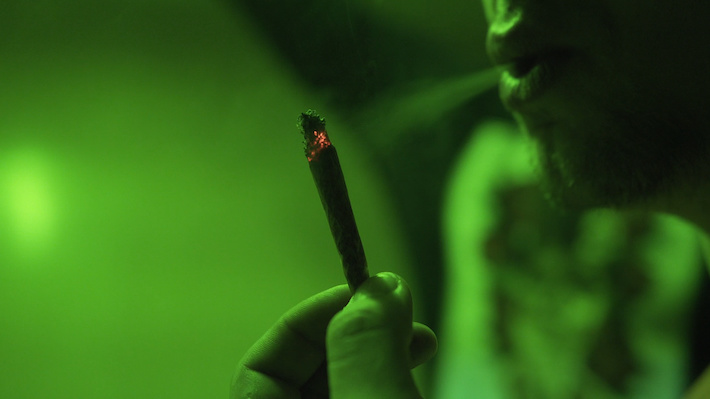
There’s a lot of confusion around this. Many new users of CBD think hemp can get you high simply because it’s part of the cannabis family and contains trace (<0.3%) THC. They confused hemp with marijuana, which contains much more THC (up to approximately 35%).
So, if you ever see a bottle of full-spectrum CBD oil and the label states it has <0.3% THC, it’s made from hemp plants and won’t get you high at all. I imagine you’d need to drink the whole bottle (maybe two) to feel any effects from the THC, and even then, it probably won’t do all that much to you.
Hempseed oil is generally very low on CBD content (20% of that of CBD oil) and contains no other cannabinoids. It definitely won’t get you high but also won’t do much for your ailments, so worth purchasing CBD oil over Hempseed oil.
If you’re looking to get high, marijuana is your friend here, buddy.
CBD high vs THC high
There’s no such thing as a “CBD high”. CBD doesn’t intoxicate you, nor does it impair your thinking, judgment, and memory. Casual cannabis users typically prefer to use CBD products derived from hemp simply because there are no high or otherworldly feelings attached to them.
A “THC high”, on the other hand, definitely exists. It’s very intoxicating and will impair your thinking, judgment, and memory. This is why THC is far more favorable amongst recreational marijuana users.
Do other cannabinoids get you high?
THC is the only cannabinoid in varieties of cannabis that (without a shadow doubt) will get you high as hell. Other major cannabinoids such as CBD, cannabigerol (CBG), and cannabichromene (CBC) do not produce any intoxicating effects.
However, tetrahydrocannabivarin (THCV), which is a homolog of THC, is known to produce some intoxication in high doses by interacting with your CB1 receptors. On the flip side, THCV in lower doses may actually act like CBD insofar as inhibiting THC’s ability to bind to CB1 receptors. This has the potential to lessen THC’s effects.
Do terpenes get you high?
Terpenes do not get you high. Instead, they provide your cannabis with beautiful aromatic qualities. They also contain some pretty awesome health benefits as well, which we’ll explore below.
The most common cannabis terpenes include:
Myrcene
Myrcene is the primary terpene found in varieties of cannabis (at least 65% of all cannabis varieties contain this terpene). Myrcene is known for its anti-inflammatory & pain-relieving properties. Combined with CBD’s anti-inflammatory and pain-relieving qualities, myrcene is very beneficial to have in your hemp or marijuana-derived product.
Pinene
Pinene is one of, if not the most common terpene found in nature. There’s typically an abundance of it in varieties of cannabis (both marijuana and hemp). Aromatically, it can produce mood-lifting qualities. When consumed, it provides your body with anti-inflammatory qualities. It’s also a bronchodilator and helps relax and open up your airways.
Limonene
Limonene provides your cannabis with citrusy aromas. It’s commonly found in citrus fruits such as oranges, lemons, and limes. This citrus aroma may be useful for stress and anxiety. When consumed, researchers believe it’s effective for blood pressure, heart health, and inflammation.
Certain strains carry different terpenes (each with their own benefits)
Certain strains carry different terpenes (or different terpene profile variations). Sour Diesel, for example, contains a high level of myrcene and limonene, which enhances the strain’s uplifting qualities. This is perfect for inflammation, pain, stress, anxiety, and confidence.
Pineapple, on the other hand, contains high levels of pinene. Alone, pinene is an anti-inflammatory. Pair it with the Pineapple strain’s stress-relieving properties and you have an amazing combination, especially if you’re in a negative mood or you have an occupational/sports injury.
Where to get intoxicating CBD products? (tips, what to look for, where to buy)
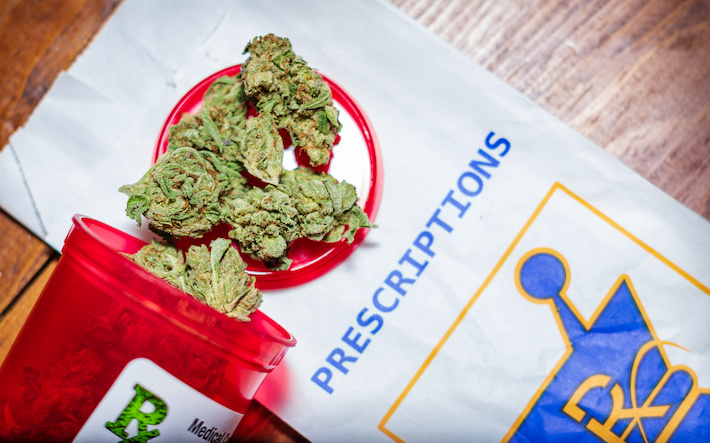
When I say intoxicating CBD products, what I really mean is marijuana-derived CBD products — the ones with more than 0.3% THC. These products are less common than non-intoxicating CBD products (hemp-derived with <0.3% THC), simply because federal law prohibits cannabinoids (THC or otherwise) sourced from the marijuana plant. Only individual states have legalized marijuana-derived products for both recreational and medicinal purposes.
If you’re looking to purchase marijuana-derived products (THC oil, THC capsules, etc), you first need to make sure your state allows it. Some states such as California, Nevada, Oregon, and Washington have legalized marijuana and its products recreationally and medicinally. However, states such as Idaho, Nebraska, Idaho, and South Dakota have made all forms of cannabis totally illegal. You can find more info about this here.
If your state allows marijuana recreationally, you can purchase it from local dispensaries and online. Make sure the products are third-party tested and the extract is sourced from organically grown marijuana.
Where to get non-psychoactive CBD products? (tips, what to look for, where to buy)
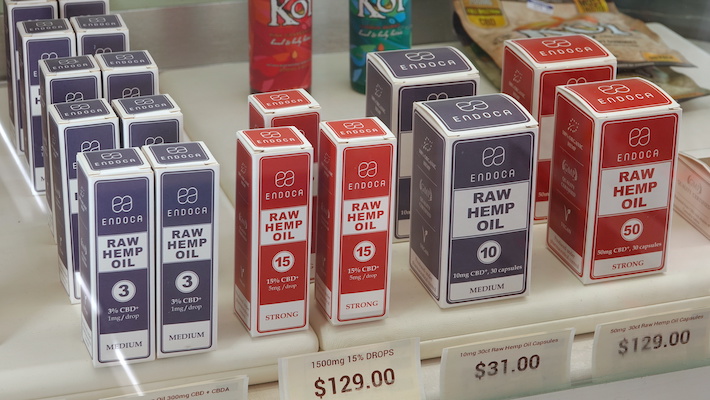
Non-intoxicating CBD products refer to hemp-derived products with less than 0.3% THC. These include hemp-derived CBD oils, hemp-derived CBD capsules, hemp-derived CBD e-liquids, and so on and so forth.
Hemp-derived CBD products are very easy to find. You can find them at online CBD stores, in pharmacies, in vape and tobacco shops, and your local gas station (gas station CBD is generally low quality, so probably best to avoid).
Buying online is the easiest and most convenient option, to be honest. There are, however, things you should definitely look out for:
- Third-party testing and Certificates of Analysis (COA) — this must be conducted by accredited laboratories with no affiliation to the company
- Information on where the company sources its hemp — preferably from organic USA farms
- Ingredients list — no synthetic or unnatural ingredients should be listed
- Hemp extract information — does it have an isolate/broad-spectrum/full-spectrum extract?
If you’d like to know more about what to look out for when purchasing CBD products, follow our guide to buying CBD here.
